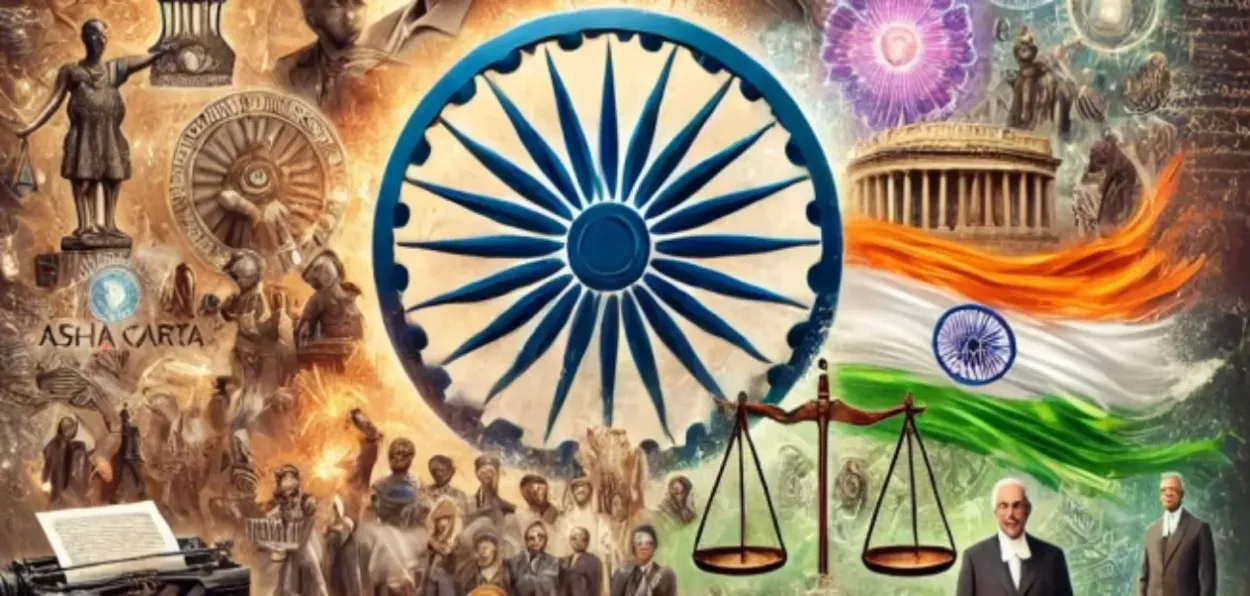
Saquib Salim
The most repeated argument from the colonial British Empire and its apologists against the people demanding freedom of India was that the Indians were not capable of ruling over a large country. When India gained independence on 15 August 1947, the West was more than eager to question the capability of Indians to run a government. But, a determined nation led by the likes of Jawaharlal Nehru, Sardar Vallabhbhai Patel, Maulana Abul Kalam Azad, Dr. Rajendra Prasad, and others gave a befitting reply to the critics on 26 November 1949 when the Constitution of India was completed.
Slice Of History
The whole world took notice. The New York Times, in its editorial, wrote, “India will receive, and deserve, wide-spread congratulations from all parts of the world on the adoption of her constitution."
"The Indian constitution," The New York Times wrote, "unlike some others, is not merely a declaration of principles. It is a detailed and intricate body of organic law containing many elements that in some other countries are to be found in statutory rather than in constitutional law."
The paper also noted that “The democratic character of this constitution was assured from the beginning when it was clear that it would undertake to combine some of the major aspects of Representative Government, as in the United States and Parliamentary Government as in the United Kingdom.”
The Sydney Morning Herald in its edition of 29 November 1949 noted, “To constitutional experts everywhere the massive instrument passed at New Delhi on Saturday will be a mine of interest.”
While the Australian newspaper admired the democratic principles and fundamental rights enshrined in the Constitution it questioned the wisdom of the Indian leaders to part ways from the symbols of the British Commonwealth. The editorial noted, “But in the Constitution of India - as her statesmen long ago determined - the Crown has not even the place of a symbol. The experiment of this new Commonwealth association is fraught with great consequences, as is the experiment of the Indian Federal Republic itself. If the acceptance of a Republic within the fold weakens - as so many fear - the bonds of a unique company of nations, so much harder will - be the path of the statesmen of New Delhi.”
The time proved these ‘fears’ of our Western colonizers to be wrong. Neither did the ‘nations’ of India war among each other nor the Indian democracy weakened. India is one of those very few countries in Asia that has had smooth running electoral democracy since after the Second World War.
The news report by the Associated Press widely published in the West while acknowledging the feat tried to bring out fissures in Indian society. The report said, “Dr. Rajendra Prasad, president of the assembly, declared India will become a republic Jan. 26, when the constitution is inaugurated, after 2,000 years of Hindu, Moslem, and British Empire rule.”
The report did not miss to mention that one member did not agree with the Constitution. The West wanted to showcase that if Indians could not have unanimous opinions, the country was bound to fail. Only one, out of more than 300 Constituent Assembly members, did not agree with the final draft was pointed out as a blot on the Indian Constitution.
The report read, “One dissenter objected to the adoption of the constitution. He was Maulana Hasrat Mohani. A Moslem from the United Provinces. He said the document fails to provide real liberty for the common man. He had previously contended that India should associate herself with Russia if she cannot stay completely clear of international ties.”
The stress on Hasrat Mohani being a Muslim was to prove to the Western audience that India would not be a united country after the Partition. Also, the report played on the fears of the West that India could turn into a Communist country. The Western media implicitly conveyed that India could not survive as a democracy and if it did then the country would be a threat to the West.
The report did not take into account that Mohani’s disagreement was that the Constituent Assembly had not been elected with a Universal Adult Franchise and a new Assembly should be elected with a complete representation of Indians. Mohani was a forceful voice against the special treatment of minorities, including Muslims, as he believed that it divided the nation.
The New York Times also implied the impracticality of the Constitution. It wrote, “The essential function of the constitution is to establish and empower a Central Government. Some Indians have been fearful lest too much power accrue to the Centre." Such fears, the paper said, “were natural in a country with different levels of development.”
The time has proved all these ‘fears’ of the Western media to be wrong.
